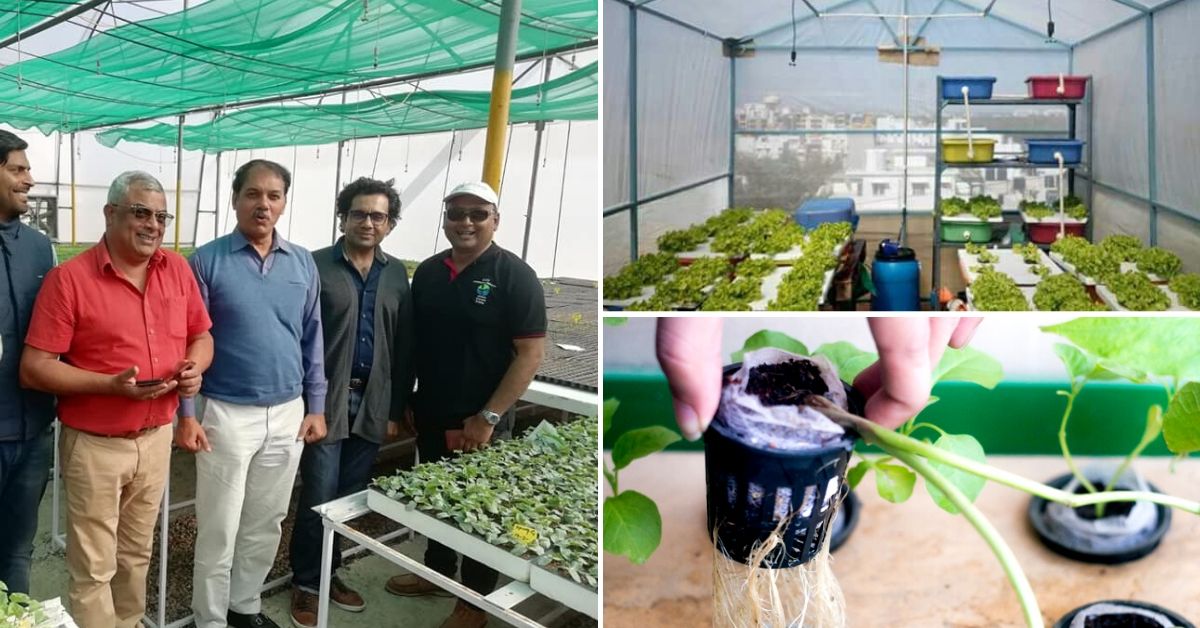We often receive emails from our readers, asking doubts about their experiments with sustainable living. So, here’s a section dedicated to you – TBI’s ‘agony aunt’ for all things green.
This week, we received an email from MV Rajeshwara Rao asking for practical tips on how to start a hydroponic farm.
To guide him and other readers like you, we got in touch with Lt Cdr (Retd.) CV Prakash, a Bengaluru-based farmer who has trained over 10,000 people to grow organic food in the last 19 years and genuinely believes that “There is no greater pleasure than eating the food that you have nurtured with your hands.”
Here, he explains what one requires to set up a hydroponics farm, how to nurture it, and how to make the most of your rooftop space for a green, healthy environment.
Prerequisites for hydroponics systems:

- A space of 10X10 feet on your balcony or the rooftop.
- An initial investment of about Rs 10,000 for this space.
- About 4 hours of your time to spend in your garden every day (the reason is explained below)
- An assortment of vegetables you want to grow. If you grow a variety of vegetables in your set-up, you can harvest a total of 1 kg of veggies every day, which is enough to feed a family of four or five people.
- Practical training. “Attending workshops or courses will give you a better, more personal understanding of hydroponics which is crucial for healthy cultivation of plants,” he informs The Better India.
We have a range of workshops for you to attend over the weekends. Click here to book your place in a hydroponics workshop in a location convenient to you.
How to set up a hydroponic farm:
It is crucial to understand that setting up a hydroponic farm it is not a robotic process of watering the plants at a fixed time every day and expecting them to grow.
The process is dynamic, where the climate, weather, seasons all play a crucial part in determining how much water, nutrients, and light your plant requires. Every plant is different, and there is no set formula to follow.
- You can start your hydroponics journey by planting saplings in grow bags and bottles. Click here to know how to upcycle bottles and boxes for the same. Once you master that, you can move onto bigger PVC pipes. Here’s how to build hydroponics set up with such pipes.
- Choose cauliflower, brinjal, chillies, capsicum, tomatoes, carrots, beetroot, lettuce, ginger turmeric fenugreek, spinach and such other vegetables for your farm. They grow well and offer a variety of organic food for your table.
- Once you have chosen the vegetables according to your location and planted them, ensure adequate nutrition to them with cocopeat, tech grade fertiliser and helpful bacteria.
- “I recommend hydroponics be undertaken by a family who has someone staying at home- like a homemaker or retired person so they can spend a few hours with the plants. Observation is everything when it comes to hydroponics, and you can detect diseases, pests and other conditions of the plants if you spend time on your farm,” the 56-year-old explains.
- A 1-square-metre big farm requires about 4 litres of water every day. So according to the size of your farm, you can determine the amount of water the plants need.
- Planting, watering, harvesting and storage processes change according to the season and weather. You need to be particular about this.
- Hygiene is of utmost importance.
Lt Cdr (Retd) Prakash further mentions that a hydroponic farmer has to know the basics of nursery management, irrigation, media selection (hydroponics/aquaponics, growing plants in bottles/pipes or grow bags etc.), climate control in greenhouses, structure selection, location choosing, harvest procedure and post-harvest grading before they undertake hydroponics. “Basically, horticultural skills are paramount for success,” he concludes.
To sum up, do make an informed decision before starting a hydroponic farm, and it is advisable to attend a workshop or a course to get started.
Wondering how to recycle plastic bottles or how to make your own skincare products? Whatever your doubt, do reach out to us at contact@thebetterindia.com
You may also like: Experts Answer: How To Grow Mushrooms At Home For Just Rs 300
(Edited by Gayatri Mishra)
Like this story? Or have something to share? Write to us: contact@thebetterindia.com, or connect with us on Facebook and Twitter.
If you found our stories insightful, informative, or even just enjoyable, we invite you to consider making a voluntary payment to support the work we do at The Better India. Your contribution helps us continue producing quality content that educates, inspires, and drives positive change.
Choose one of the payment options below for your contribution-
By paying for the stories you value, you directly contribute to sustaining our efforts focused on making a difference in the world. Together, let's ensure that impactful stories continue to be told and shared, enriching lives and communities alike.
Thank you for your support. Here are some frequently asked questions you might find helpful to know why you are contributing?

